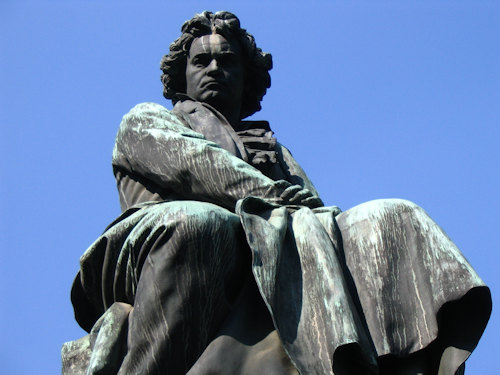Vienna has long been the beating heart of classical music. Home to legendary composers and musicians who shaped the sound of their time, the city earned its reputation as the “City of Music.” From the halls of the imperial court to its cozy coffeehouses, Vienna has been an essential hub for musical innovation and creativity. As we explore the musicians in Vienna’s history, we’ll dive into the stories of the great masters who left an indelible mark on the city and the world.
Wolfgang Amadeus Mozart: The Wunderkind
No discussion of Vienna’s musical heritage is complete without mentioning Wolfgang Amadeus Mozart. Born in Salzburg in 1756, Mozart moved to Vienna in 1781, seeking greater opportunities. The city quickly became the stage for his genius, where he composed some of his most famous works, including “The Marriage of Figaro” and “Don Giovanni.”
Mozart’s presence was felt across Vienna, from the opulent halls of the imperial palace to the lively theater scene. Despite his incredible talent, Mozart faced financial struggles and a challenging life, yet his compositions continue to resonate with audiences worldwide. Today, Vienna celebrates his legacy with countless concerts, operas, and even a museum dedicated to his life.

Ludwig van Beethoven: A Revolutionary Spirit
Another towering figure among the musicians in Vienna’s history is Ludwig van Beethoven. Originally from Bonn, Beethoven settled in Vienna in 1792, where he studied under Joseph Haydn and immersed himself in the city’s vibrant musical culture. Known for his bold, emotional compositions, Beethoven pushed the boundaries of classical music and transformed the genre.
Beethoven’s Symphony No. 9, featuring the “Ode to Joy,” stands as one of the most iconic pieces ever written. His late string quartets are also revered for their emotional depth and complexity. Despite losing his hearing, Beethoven’s determination and creativity remained undimmed, making him a true symbol of perseverance in Vienna’s musical history.

Franz Schubert: Vienna’s Own Lyrical Master
Franz Schubert, born in Vienna in 1797, was one of the city’s most beloved composers. Unlike many of his contemporaries, Schubert stayed in his hometown, deeply influenced by the city’s musical and cultural landscape. Known for his lieder (German art songs) and symphonies, Schubert captured Vienna’s spirit in his compositions.
His pieces like “Ave Maria” and “Symphony No. 8 (Unfinished Symphony)” showcase his lyrical and emotional style. Though he lived a short life, passing away at just 31, Schubert’s impact on music was profound. Today, Vienna honors his memory with annual festivals and performances, keeping his music alive for modern audiences.
Johann Strauss II: The Waltz King
Among the greatest musicians in Vienna’s history is Johann Strauss II, also known as the “Waltz King.” Born in Vienna in 1825, Strauss transformed the waltz into an international sensation. His lively compositions brought a new energy to Viennese ballrooms, making the dance synonymous with the city’s charm and elegance.
Pieces like “The Blue Danube” and “Tales from the Vienna Woods” remain timeless, echoing the city’s elegance and vibrant atmosphere. Strauss also ventured into operetta, with “Die Fledermaus” being one of his most famous works. His influence is still evident in Vienna’s cultural life, with his music forming a central part of the city’s identity.

Gustav Mahler: The Symphonic Innovator
Gustav Mahler, a late-Romantic composer and conductor, stands out as a modernist force among Vienna’s musical legends. Born in 1860, Mahler made Vienna his base, conducting at the Vienna Court Opera and creating groundbreaking symphonies that shaped the transition into the 20th century. His work, deeply emotional and grand in scale, redefined the symphonic form.
Mahler’s “Symphony No. 5” and “Das Lied von der Erde” are notable examples of his ability to blend orchestral intensity with intimate emotions. His contributions to Vienna’s musical scene made him one of the most influential figures of his time. Vienna honors his legacy through ongoing performances of his work, celebrating his innovative spirit.
Joseph Haydn: The Father of the Symphony
Joseph Haydn, one of the early giants of classical music, also left a lasting mark on Vienna. Although he was born in Rohrau, Austria, Haydn spent a significant part of his life in Vienna. Known as the “Father of the Symphony” and the “Father of the String Quartet,” Haydn’s influence on composers like Mozart and Beethoven is undeniable.
Works like “The Creation” and his numerous symphonies showcase his ability to craft elegant, structured compositions that helped define the Classical period. Vienna celebrates his contributions through concerts and exhibitions that highlight his impact on the city’s musical heritage.
Antonio Salieri: A Versatile Maestro
Antonio Salieri, an Italian-born composer, spent most of his career in Vienna and became one of its central figures in the late 18th century. While often overshadowed by Mozart in popular imagination, Salieri was an accomplished composer and conductor in his own right. His works spanned operas, symphonies, and sacred music, and he played an influential role in the city’s musical scene.
His operas like “Tarare” and “Les Danaïdes” reveal his talent and versatility. Salieri also mentored many young composers, including Beethoven and Schubert, leaving a lasting legacy as a teacher and conductor in Vienna.
Johannes Brahms: The Romantic Traditionalist
Johannes Brahms, a leading figure of the Romantic period, moved to Vienna in 1862 and remained there for much of his life. Deeply influenced by the city’s rich musical tradition, Brahms combined classical structure with Romantic expression, creating timeless works such as “Symphony No. 4” and “Hungarian Dances.”
Brahms’ dedication to musical form and his emotional depth made him one of Vienna’s most important composers. Today, his music is frequently performed in Vienna’s concert halls, and his legacy continues to inspire musicians and composers around the world.
Anton Bruckner: The Master of Grand Symphonies
Anton Bruckner, another significant name in Vienna’s musical history, brought a unique approach to symphonic music. Born in Ansfelden, Austria, Bruckner eventually settled in Vienna, where his grand, complex symphonies pushed the boundaries of the form. His works, such as “Symphony No. 7”, are characterized by their monumental structure and spiritual depth.
Though Bruckner faced criticism during his lifetime, his influence grew over time. Today, Vienna celebrates his music with regular performances, recognizing his contributions as essential to its cultural landscape.
Arnold Schoenberg: The Innovator of Modernism
Arnold Schoenberg, born in Vienna in 1874, revolutionized music with his development of the twelve-tone technique, which broke away from traditional tonality. As a key figure in the Second Viennese School, Schoenberg led the city into the modernist era with groundbreaking works like “Pierrot Lunaire” and “Verklärte Nacht.”
Schoenberg’s impact on music theory and composition is profound, influencing generations of composers worldwide. Vienna continues to celebrate his legacy through performances and exhibitions that showcase his innovative spirit.
Alban Berg: The Expressionist Voice
A student of Schoenberg, Alban Berg blended late Romanticism with modernist elements, creating operas like “Wozzeck” and “Lulu.” Berg’s works brought the emotional intensity of expressionism to life, and his influence remains strong in Vienna’s music scene, as his works are performed regularly.
Anton Webern: The Minimalist Visionary
Anton Webern, another member of the Second Viennese School, was known for his brief yet deeply intense compositions, such as “Five Pieces for Orchestra.” His work, characterized by its minimalist approach, continues to influence modern music, with Vienna acknowledging his contributions through ongoing performances.
Christoph Willibald Gluck: The Opera Reformer
Gluck transformed opera during the 18th century, seeking dramatic realism and emotional depth in his works like “Orfeo ed Euridice.” His reforms in Vienna paved the way for future operatic compositions, making him a crucial figure in the city’s musical evolution.
Carl Czerny: The Influential Teacher
Carl Czerny, a student of Beethoven, became a renowned piano teacher and composer of technical studies like “The School of Velocity.” Czerny’s influence reached generations of pianists, including Franz Liszt, and he remains a significant figure in Vienna’s musical education legacy.
Hugo Wolf: The Art Song Master
Hugo Wolf’s contribution to Vienna’s musical history comes through his powerful lieder, such as the “Mörike-Lieder.” Influenced by Wagner, Wolf’s expressive songs expanded the art song genre, and his music continues to be an important part of Vienna’s concert repertoire.
Antonio Vivaldi: The Baroque Virtuoso
Although primarily associated with Venice, Antonio Vivaldi spent his final years in Vienna. Known for his violin concertos like “The Four Seasons,” Vivaldi’s influence extended beyond Italy, and his music remains an integral part of Vienna’s Baroque performances today.
Franz Liszt: The Virtuoso Pianist
Franz Liszt, though originally from Hungary, spent significant time in Vienna, where he developed his extraordinary piano skills. His virtuosic style and compositions, like “Hungarian Rhapsodies,” transformed piano music and left a lasting impact on Vienna’s musical culture.
Anton Diabelli: The Publisher and Composer
Anton Diabelli, a Viennese composer and publisher, is best known for his “Diabelli Variations,” which inspired Beethoven’s famous work. His contributions as a music publisher helped shape the careers of many composers in Vienna. He truly left a significant legacy in the city’s musical history.
Johann Nepomuk Hummel: The Transitional Composer
Johann Nepomuk Hummel was a student of Mozart. He blended classical and early Romantic styles in his works. One example for that, is his “Trumpet Concerto”. Hummel’s time in Vienna contributed to the city’s transitional period between musical eras, and his influence is seen in the works of later Romantic composers.
Vienna Today: A City of Music and Legacy
Vienna remains a city where music thrives, drawing on its rich history. The legacy of these great musicians in Vienna’s history is visible everywhere. You can see them at the grand concert halls of the Wiener Staatsoper to the intimate settings of local cafes. The city’s music festivals and performances keep these legends alive, allowing visitors and residents alike to experience the melodies that defined Vienna’s Golden Age.
The greatest musicians in Vienna’s history await on our tours!
Want to hear more about the Musicians in Vienna’s history who shaped the city? We offer two exclusive tours designed for music lovers and curious explorers:
- The Secrets of Vienna’s Musicians Tour: Discover the hidden stories behind Vienna’s greatest composers. From Beethoven to Schubert, learn about their life and see the places that inspired them.
- The Johann Strauss II Tour: Step into the life of the Waltz King. Visit iconic sites connected to his legacy and experience the music that brought Vienna’s ballrooms to life.
Discover the heart of Vienna’s musical history and explore the magic of its greatest composers. Book your tour today!

